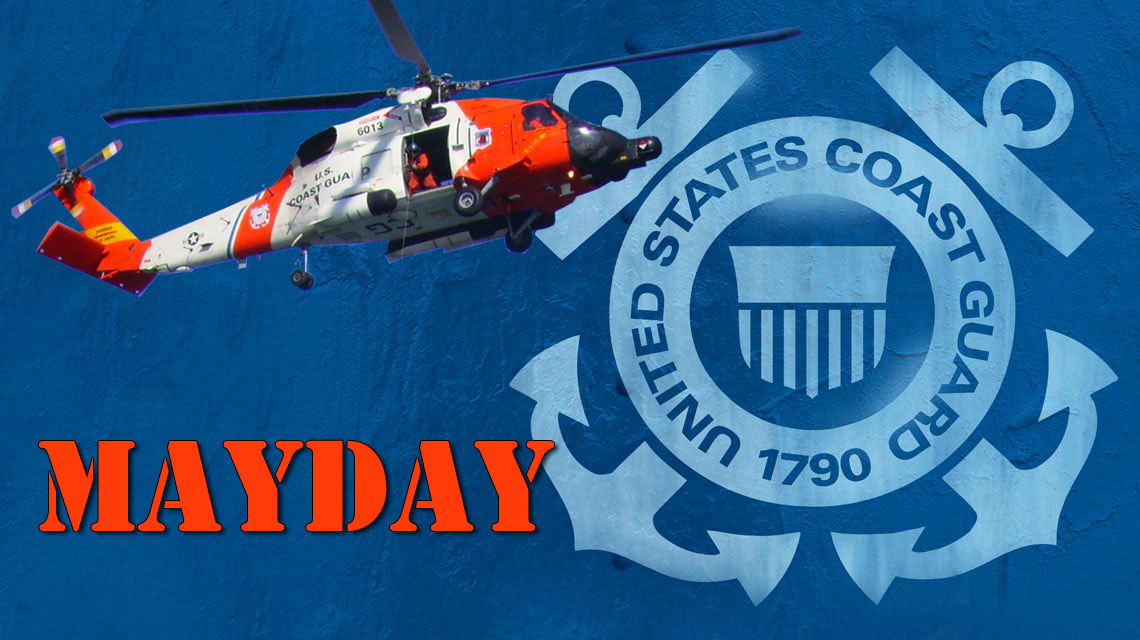
Emergency Procedure Words
There are three emergency procedure words that carry extra importance when you're communicating by radio. In order of decreasing severity, they are mayday, pan-pan, and sécurité.
Emergency Words
| Word | Derivation | Meaning | When To Use | Comment |
|---|
| MAYDAY | From the French "m'aidez," which means "help me" | A vessel and/or crew is in grave and imminent danger | Life-threatening medical emergency; possibility of losing the boat | Use for imminent danger only |
| PAN-PAN | From the French "panne," which means "broken" | A vessel requires urgent assistance | Serious mechanical breakdown; urgent but not life-threatening medical issues | Because it handles such a wide range of difficulties, details can be added to the transmission: "Pan-pan, pan-pan, pan-pan, this is the vessel Surprise requesting medical advice, over." |
| SÉCURITÉ | French for "safety" | Important safety information follows | Information that could be important to another vessel's safety | Covers a wide range of issues: hazards to navigation, pyrotechnic demonstrations, Coast Guard Marine Safety Broadcasts, large vessel traffic alerts" |
Through the use of these words, you will alert all mariners to the seriousness of your transmission, and to the possibility that they might be involved in lending assistance. All three are anglicized versions of French words, and each is repeated three times in succession so that those who hear the transmission understand that they're hearing an actual call for help and not a discussion of another vessel's distress call. (See additional comments on mayday relay below.)
When you hear a transmission that uses one of the three emergency words, what action should you take? A lot depends on your proximity to the vessel or incident in question. It also depends on your ability to respond and give assistance. If you hear a mayday and you are the most appropriate vessel to respond, you are legally and morally required to lend assistance, if you can do so without endangering your crew or vessel.
Common VHF Channels And Their Uses
While VHF radios may have anywhere from 55 to 80 channels, there are relatively few that can be used by recreational boaters. This table lists the most common ones, but because VHF channel use is somewhat geographically specific, a few channels may be different in your home waters. The VHF channels used in Canada and Internationally may have different frequencies and different functions than those used in the U.S.
| Channel | Simplex/Duplex* | Purpose |
|---|
| *A simplex channel transmits and receives on the same frequency. Duplex channels use different frequencies for transmitting and receiving. |
|---|
| 16 | Simplex | International distress, safety, and hailing. Monitoring required while underway. |
| 6 | Simplex | Intership safety. Frequently used by towing companies. |
| 22A | Simplex | U.S. Coast Guard working channel. Referred to as "22 Alpha." Maritime Safety Information Broadcasts are announced on Channel 16, then broadcast on 22A. |
| 21A, 23A | Simplex | U.S. Coast Guard only. In rare instances, the Coast Guard may ask you to communicate with them on these channels. |
| 9 | Simplex | Boater calling (commercial and noncommercial). Recommended for hailing another vessel (to reduce traffic on Channel 16). Many radios can monitor 16, 9, and a working channel. |
| 13 | Simplex | Intership navigation safety. Ships are required to monitor Channel 13 when at sea. Effective if you are trying to contact a specific vessel in your area, especially if there is risk of collision. Transmissions are limited to 1W to reduce interference. |
| 14 | Simplex | Port operations. In areas with Vessel Traffic Service (VTS), this is the channel they use to communicate with large ship traffic. Can be very helpful for tracking vessels. |
| 24-28, 84-87 | Duplex | Port operations. In areas with Vessel Traffic Service (VTS), this is the channel they use to communicate with large ship traffic. Can be very helpful for tracking vessels. |
| 68, 69, 71, 78A | Simplex | For noncommercial communications with other vessels or shore stations. Traffic must be concise. Commonly used by race committees, along with Channel 72. |
| 72 | Simplex | Similar to previous channels but only for ship-to-ship. No land-based stations can use channel 72. |
| 70 | Simplex | Digital only; used by DSC functions on the radio. |
| WX 1-9 | Simplex | NOAA weather channels. Local weather is usually on WX1-WX4. |
Mayday Relay
If you're the only person to hear a mayday call from another vessel, you may have to act as a relay to rebroadcast vital information to the Coast Guard or other rescue agencies. In that case, use the words "mayday relay." This tells other vessels and stations that you're not the one in trouble, but aware of a vessel in trouble.
Finally, nothing is more frustrating than hearing a mayday call, then having another vessel break in with low-priority traffic. If this happens, the vessel in distress can remind them to keep the channel open (assuming they've taken a Safety at Sea seminar or have read Chapman Piloting & Seamanship) by saying Silence Mayday (pronounced "seelonce mayday"). At the end of the emergency, the transmission Silence Fini (pronounced "seelonce feenee") tells other mariners that normal communications can resume. The French pronunciation helps differentiate these words from the normal stream of radio traffic, but it's certainly no time to worry about perfecting your accent.